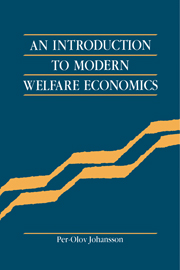Book contents
- Frontmatter
- Contents
- Preface
- 1 Introduction
- 2 Pareto optimality in a market economy
- 3 The compensation principle and the social welfare function
- 4 Measuring welfare changes
- 5 Market failures — causes and welfare consequences
- 6 Public choice
- 7 A ‘Smorgasbord’ of further topics
- 8 How to overcome the problem of preference revelation: practical methodologies
- 9 Cost-benefit analysis
- 10 The treatment of risk
- Appendix: The consumer and the firm
- References
- Index
7 - A ‘Smorgasbord’ of further topics
Published online by Cambridge University Press: 23 December 2009
- Frontmatter
- Contents
- Preface
- 1 Introduction
- 2 Pareto optimality in a market economy
- 3 The compensation principle and the social welfare function
- 4 Measuring welfare changes
- 5 Market failures — causes and welfare consequences
- 6 Public choice
- 7 A ‘Smorgasbord’ of further topics
- 8 How to overcome the problem of preference revelation: practical methodologies
- 9 Cost-benefit analysis
- 10 The treatment of risk
- Appendix: The consumer and the firm
- References
- Index
Summary
This chapter continues the analysis of goods that the market may fail to provide in efficient amounts. In particular, the chapter focuses on the role of property rights for the attainment or non-attainment of a Pareto-efficient allocation. In the first two sections of the chapter a particular good, an externality, is used to show how the distribution of property rights affects the working of the economy. After a discussion of situations where some consumers can be excluded from enjoying a particular public good, club goods and local public goods, the chapter takes a look at two ‘goods’ that may be thought of as collective in nature – the distribution of income within a generation and between generations, respectively.
Property rights, policy instruments, and the depletion of stratospheric ozone
In chapter 5 we saw that a consumption externality arises if one consumer is affected by or cares directly about another consumer's consumption or a firm's production (recall the non-smoker who dislikes smoke). Similarly, there is a production externality if a firm's production possibilities are influenced by the choices of another firm or consumer (recall the downstream fishery affected by another firm's pollution of the stream).
The basic problem with externalities is the lack of markets for such goods or bads. If there were well-defined property rights in goods involving externalities it would be possible to set up markets in externalities to encourage trade so as to achieve Pareto efficiency. Thus, the practical problem with externalities is caused by poorly defined property rights.
- Type
- Chapter
- Information
- An Introduction to Modern Welfare Economics , pp. 86 - 101Publisher: Cambridge University PressPrint publication year: 1991



